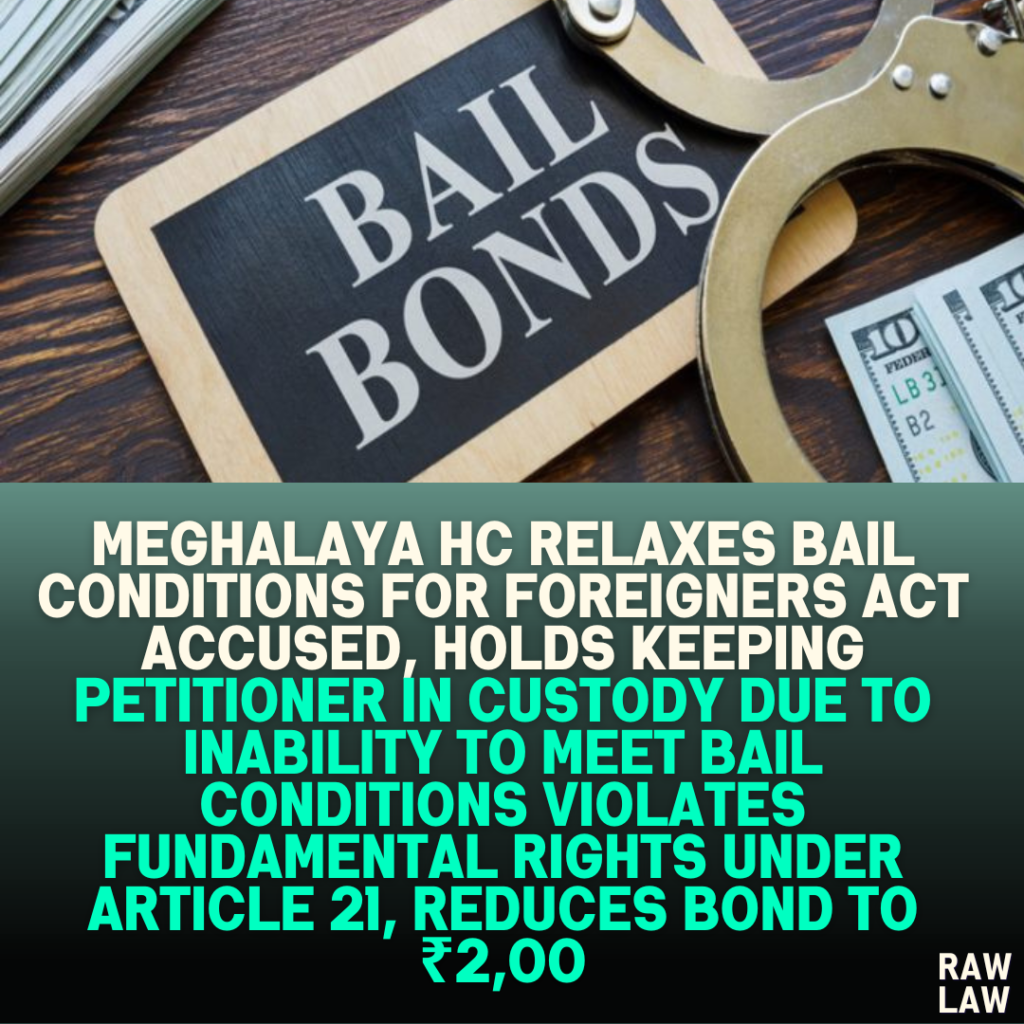Court’s Decision:
The High Court of Meghalaya granted interim bail to the petitioner’s son for a period of 60 days for medical treatment, while emphasizing that the rigor of Section 37 of the NDPS Act applies. The court directed the accused to seek treatment at CMC, Vellore, on account of his medical condition, which includes Major Depressive Disorder and suicidal tendencies. The court, however, imposed several conditions on the grant of interim bail.
Facts:
The petitioner’s son was arrested on charges under Section 21(c) of the NDPS Act after police discovered a large consignment of heroin in a farmhouse. The drugs, hidden in an iron box, were seized following a Naka check on NH-06, where the vehicle carrying the petitioner’s son was intercepted. The authorities later arrested him, along with others involved, and an FIR was lodged. The investigation concluded with a charge sheet, and the case was at the stage of consideration of charges.
The petitioner filed for bail on behalf of her son, who has been in custody for over a year. The application for bail was based on procedural irregularities and the deteriorating health of the accused.
Issues:
- Whether the procedural errors committed during the investigation under the NDPS Act warrant the grant of bail.
- Whether the medical condition of the accused justifies granting interim bail under the special circumstances despite the provisions of Section 37 of the NDPS Act.
Petitioner’s Arguments:
- Procedural Errors: The petitioner contended that the arresting authorities violated several provisions of the NDPS Act, including Section 52A and related rules, during the investigation. The primary contention was that samples from all 70 soap boxes containing heroin were mixed into one container instead of drawing separate samples from each box as required by the rules.
- Health Grounds: The petitioner further argued that her son suffers from serious medical conditions, including Hepatitis, Borderline Hepatic Steatosis, and Ulcerative Colitis. He was diagnosed with Major Depressive Disorder, coupled with suicidal tendencies, and requires urgent medical treatment, which can only be provided at CMC, Vellore.
Respondent’s Arguments:
- Seriousness of Offense: The respondent emphasized that the accused was involved in a serious drug trafficking case where a large quantity of heroin was seized. Given the widespread drug addiction issues in the State, the release of the accused on bail could exacerbate the problem, and therefore, bail should not be granted.
- Medical Treatment Available Locally: The respondent also argued that the medical conditions of the accused were not life-threatening and could be treated within the State, thus negating the need for bail on health grounds.
Analysis of the Law:
The court considered the stringent requirements of Section 37 of the NDPS Act, which mandates that bail should only be granted if the court is satisfied that there are reasonable grounds to believe that the accused is not guilty and will not commit any offense while on bail. Additionally, the court examined the exceptions under Section 437 of the Cr.P.C., which allows bail in non-bailable offenses on certain grounds, including sickness.
Precedent Analysis:
The petitioner relied on several judgments, including Simarnjit Singh v. State of Punjab, Yusuf @ Asif v. State, and Arjun Deshwal v. State of Meghalaya, to argue procedural irregularities and health as grounds for bail. However, the court noted that these precedents primarily dealt with procedural lapses that could be addressed during the trial and did not necessarily justify bail at this stage.
Court’s Reasoning:
The court acknowledged the seriousness of the offense and the application of Section 37 of the NDPS Act, which makes the grant of bail difficult in cases involving commercial quantities of drugs. However, considering the specific medical condition of the accused and the necessity for specialized treatment at CMC, Vellore, the court found it appropriate to grant interim bail.
The court emphasized that the bail was granted purely on medical grounds and imposed several conditions, including the provision of a travel itinerary, a personal bond of ₹1,00,000, and reporting back to the authorities after 60 days.
Conclusion:
The court granted interim bail for 60 days, directing the accused to report back to custody after seeking medical treatment. The bail was strictly conditional, with the court making it clear that any violation of the conditions could lead to its cancellation.
Implications:
The judgment underscores the court’s balancing act between upholding the strict provisions of the NDPS Act and recognizing the special circumstances of the accused’s medical condition. It also highlights the rigorous application of Section 37 of the NDPS Act in drug trafficking cases, where bail is rarely granted unless compelling grounds are demonstrated.
